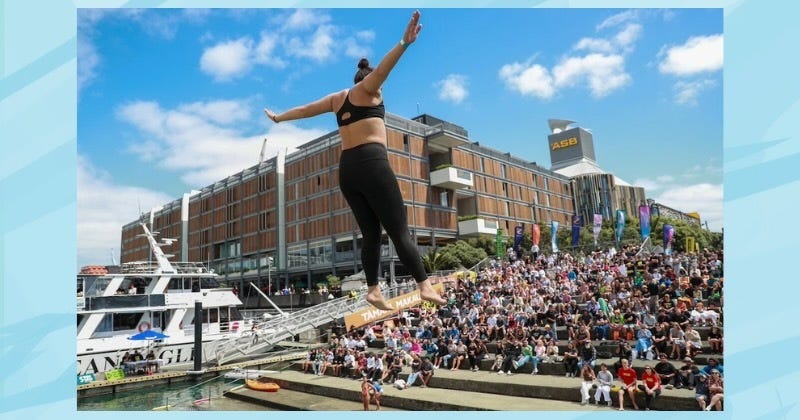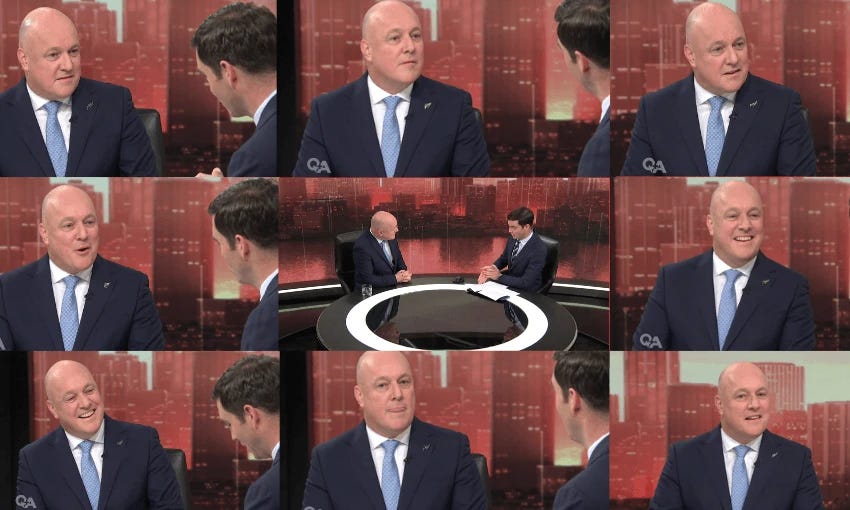What Wayne Brown wants from his 'fundamental reset' of Auckland Transport
A major win for the mayor as he successfully guts the city's transport organisation.
Mōrena, and welcome to The Bulletin for Wednesday, December 4.
In today’s edition: A charity tax loophole will be addressed at the next budget, the Electoral Commission accepts failure over the selection of Manurewa Marae as a voting base at the last election, and has Act really had disproportionate influence over the coalition’s first year in power? But first, the dethroning of Auckland Transport.
‘A fundamental reset’
Auckland Transport is set to be legislatively gutted, with many of the core responsibilities of the agency to be picked up by the city council and local boards. It fulfils a pledge made by mayor Wayne Brown, who was frequently taken issue with the actions of his own council-controlled organisation. The changes are explained here by the The Post’s Sapeer Mayron.
In short:
A new Auckland Regional Transport Committee will be established and charged with developing a 30-year Integrated Transport Plan for Auckland;
Auckland council will be designated the Road Controlling Authority;
Local boards will now also have more say in transport decisions; and
Auckland Transport would continue to deliver infrastructure services, but its policy and planning and strategy focus would be removed.
On the one sense, it’s a shock – this is a major shake up to a major, public facing organisation. On the other, it’s exactly what Wayne Brown has been wanting to do for much of his tenure in the top job. “This is the fundamental reset I have long advocated for,” the mayor said yesterday. “We can now begin transitioning AT to a council-controlled organisation focused on delivering better transport for Aucklanders."
It’s Wayne’s World
The reforms are a “huge win” for Wayne Brown who had put forward a very similar proposal around Auckland Transport for next year’s budget, argued the Herald’s Bernard Orsman. The mayor has previously advocated for council taking back control over several “council-controlled organisations”. Along with AT, the mayor wants to take a knife to events agency Tataki Auckland Unlimited and entirely abolish Eke Panuku, the city’s urban regeneration organisation. When the mayor first put forward this idea, Bernard Orsman reported at the time, the organisations disagreed. AT chief executive Dean Kimpton argued against a “full reset” and believed that “long-term infrastructure investment requires certainty beyond the political cycle, which is somewhat ‘protected’ by AT’s arm’s length status”.
Transport minister Simeon Brown said yesterday that with Auckland Transport’s responsibilities shifting to the council, the public would now be able to vote against decisions it disapproved of. In a statement, reported Stuff’s David Long, Auckland Transport’s chief executive Dean Kimpton was diplomatic and accepted the changes put forward. “AT acknowledges the announcement from the minister of transport and the mayor of Auckland… which sets a clear direction for transport governance and decision-making in our region.”
Populism vs evidence
Speaking to RNZ’s Finn Blackwell, Greater Auckland blog founder Matt Lowrie was sceptical over parts of the decision, praising the shift of some responsibilities to council but warning “this means that a populist decision might be chosen over an evidence-based decision simply because the politicians don't want to upset people”. On a recent post for his website, at the time Wayne Brown formally put forward his idea, Lowrie acknowledged there had been ongoing concerns about the lack of control the council had over transport decision-making, listing several times when Auckland Transport had “undermined” council. “The status quo clearly hasn’t worked, despite a lot of efforts to make ‘soft changes’ to it by the council over the years.” But the area where Lowrie had most of his concerns was over the new powers for local boards, telling RNZ it could be risky for them to have authority over certain transport decisions like setting speed limits.
The ‘optics’ of it all
As noted by Matt Lowrie, giving the council more power could lead to more political decisions. But Wayne Brown clearly believes that’s the right approach. As reported by BusinessDesk’s Oliver Lewis (paywalled), the mayor told reporters yesterday that people already believed the council was responsible for transport issues in Auckland and this move would make that a reality. “If it doesn’t work, I will be responsible. And I’ll happily be responsible for things I’ve had a say in,” said Brown.
The government has previously advocated for a local approach to local issues, suggesting it would like to see more responsibility shifted from central government to councils. The Spinoff’s Joel MacManus questioned whether the coalition was adhering to this in reality, noting several times when the government appeared to meddle in local politics. This latest issue is a bit of both – the government is wading into Auckland, but on the request of the mayor and in an effort to give more power to the city’s elected officials. As one local board chair claimed to RNZ, the announcement would allow for more community involvement in decision-making. The changes will take time to come into effect, given they require central government sign-off. It will likely take until after the next local election to be implemented in full, giving the mayor a lengthy runway to prove his views make sense. Time will ultimately tell whether it pays off or, as Wayne Brown observed, the city tells him he got it wrong.
The Royal New Zealand Ballet’s A Midsummer Night’s Dream concludes its celebrated tour with a final chance to experience it in Auckland.
Don’t miss this spellbinding production at the Aotea Centre from 5–8 December and the Bruce Mason Centre from 13–14 December. Praised for its “poignant and magical” storytelling (The Post) and “breathtaking set and costume design” (Theatreview), this is a must-see celebration of ballet, music, and enchantment. Book your tickets today! (sponsored)
‘Tweaks’ to charity tax on the way
The finance minister has pledged to finally address a loophole that allows businesses masquerading as charities to avoid paying their fair share of tax. But we’ll have to wait until Budget 2025 to learn the details. Appearing before the finance select committee as part of parliament’s Scrutiny Week, reported RNZ’s Jo Moir, Nicola Willis said she would be looking at any “tweaks” to the charity tax regime. “What essentially we're doing is looking to see if there are any loopholes that are being exploited that would allow entities that are structured as charities to avoid tax they should otherwise pay,” she told the committee.
No decisions have been made yet nor has advice been provided to cabinet, said Willis. “There are a number of details here, what I want to work through carefully is not punishing the good while trying to go after the bad,” said Willis.
It’s always worth watching this episode of Alice Snedden’s Bad News on churches and charities if you need a refresher on how things stand currently.
Meanwhile, the government is also expected to look at introducing more road tolls as one way of raising revenue. As Interest’s Dan Brunskill reported, Labour has urged Nicola Willis to be more upfront about any future “sneaky taxes” the government intends to bring in.
More reading: The government wants road tolls, but a new poll shows the public may still have to be convinced.
The future of The Spinoff depends on its audience
As many of you will have seen, we published an open letter last week outlining the financial situation we find ourselves in. Only 2% of our audience financially supports us. Doubling that number is our last, best shot at retaining the ability to carry on doing what we do. To those who have already supported, we thank you. If you can and haven't yet, please become a member or donate today.
Has Act really had disproportionate power in the coalition?
Act Party leader David Seymour, marking the recent one-year anniversary of the coalition government’s rise to power, declared that his party had made a “disproportionate contribution to policies”. But is this true? The Spinoff’s Toby Manhire has attempted to analyse that statement, including by matching each government bill introduced with the minister in charge and by looking at impact in the media.
The results, Manhire determined, showed that perhaps Seymour had slightly exaggerated his influence. Though, on the flipside, influence isn’t the most simple metric to measure through pure numbers. Do you reckon Toby got it right? Let me know in the comments.
Inside the Manu World Champs: ‘I felt a pull to master the art’
In just under two years, the Z Manu World Champs have taken Aotearoa by storm, turning a beloved pastime into a high-stakes summer showdown. From backyard pools to national qualifiers, Kiwi of all ages are gathering to pop the ultimate manu.
Read more about the upcoming champs in our story here. (sponsored)
Click and Collect
The Electoral Commission accepts failure over the selection of Manurewa Marae as a voting base at the last election, with a report due back shortly.
Years of original New Zealand journalism from the Newshub website, including news video, articles and photography, has been migrated across to Stuff.
Sanitarium will stop making peanut butter leaving at least one man from Christchurch distraught. “It’s in our marriage contract that I provide him with Sanitarium PB until his death,” the man’s wife said.
In world news, South Korean president Yoon Suk Yeol declared martial law only for lawmakers to lift the declaration hours later.
For Herald Premium subscribers, I enjoyed Simon Wilson’s glimpse inside the costly Boris Johnson long lunch that was held in Auckland yesterday. (paywalled)
It's the best time to buy an EV, according to one motoring expert, with the vehicles selling more cheaply than when the rebate scheme was in place.
Tara Ward goes on a journey through the 26 times Luxon said “what I say to you is” on Q+A. Claire Mabey compiles an alternative summer reading list for the prime minister. Alex Casey reviews a sexy, sweaty spectacle at Spark Arena (the Troy Sivan show). Stephen Day explains how a new tool maps Aotearoa with a Māori lens. Liam Rātana considers the presence of armed police at a gang tangi and asks: who's intimidating who? For The Cost of Being, a 41-year-old GM who's moved back into the whānau home discusses her expenses.
That’s it for today. Thanks for reading and see you back here tomorrow.
Want to get in touch? Join the conversation in the Substack comments section below or via email at thebulletin@thespinoff.co.nz if you have any feedback on today’s top stories (or anything else in the news).
If you liked what you read today, share The Bulletin with friends, family and colleagues.



















Loved Tara’s article on Luxon’s “What I say to you is …”
Here’s an idea for another one: count the number of times Dan Corbett says “same sort of thing” and “same thing” over a week of One News Weather.
I look forward to AT being firmly under the control of council and becoming accountable.
Hopefully, the public will no longer have to put up with being fobbed off by AT spin doctors